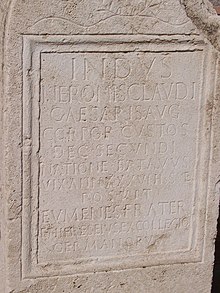Numerus Batavorum

The Germanic bodyguard (Latin: Germani corporis custodes[2], in the literary sources also called the numerus Batavorum[3] oder cohors Germanorum[4]) was, a personal, imperial guards unit for the early roman emperors from Augustus to Galba, second only to the Praetorian Guard.
From de bello Gallico, we know that Julius Caesar also had a Germanic bodyguard.[5]
The members of the Germanic bodyguard were recruited mainly from the Germanic tribe of the Batavians, but also from the Ubii. Little is known about their organisation; from inscriptions it is known that there was an (under)officer rank of decurion. The exact size of the force, which was at least partially mounted, is also unknown; it could have had a strength under the Emperor Caligula of 500 to 1,000 men.
The Germanic bodyguard was valued as loyal and reliable.[6] Emperors like Nero trusted the Germanii especially because they were not of Roman origin.[7]
The bodyguard was disbanded briefly after the Battle of the Teutoburg Forest, and was finally dissolved by Galba in 68.[4] Their indirect successors were the Equites singulares Augusti which were, likewise, mainly recruited from the Germanii.
Literature
- Michael P. Speidel: Germani Corporis Custodes. In: Germania 62, 1984, pp. 31–34 (not evaluated).
- Oliver Stoll: Leibwache. In the Lexicon of Germanic Antiquity Studies (Reallexikon der Germanischen Altertumskunde) (RGA). 2nd edition, Vol. 18, Walter de Gruyter, Berlin/New York 2001, p(p). 232–233 (Auszug at Google books)).
External links
Remarks
- ^ National Museum of Rome, Baths of Diocletian, Rome. Inscription: AE 1952, 148: Indus / Neronis Claudi / Caesaris Aug(usti) / corpor(is) custos / dec(uria) Secundi / natione Batavus / vix(it) ann(os) XXXVI h(ic) s(itus) e(st) / posuit / Eumenes frater / et heres eius ex collegio / Germanorum "Indus, bodyguard of Nero Claudius Caesar Augustus, of the Second Decuria, of the Batavian nation, [who] lived 36 years, is buried here. [The gravestone] was erected by his brother and heir, Eumenes, from the collegium of the Germans".
- ^ Suetonius, Caligula 58, 3 and inscriptions, e. g. AE 1952, 148.
- ^ Sueton, Caligula 43.
- ^ a b Sueton, Galba 12.
- ^ Caesar, de bello Gallico 7, 13, 1.
- ^ Sueton, Galba 12: multisque experimentis fidelissimam.
- ^ Tacitus, Annals 15, 58: Germanis, quibus fidebat princeps quasi externis.
